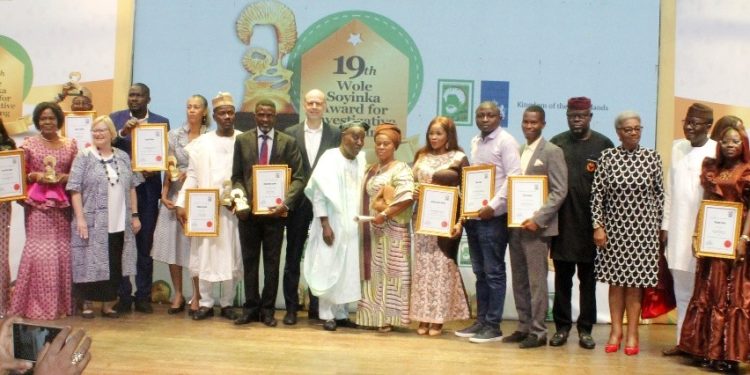Journalists, media proprietors, and stakeholders have stressed the urgent need to improve the quality of investigative reports to combat threats to media credibility at the 19th Wole Soyinka Award for Investigative Reporting.
The event, hosted by the Wole Soyinka Centre for Investigative Journalism (WSCIJ) in Lagos, celebrated the outstanding work of 15 journalists and honoured Chinyere Okunna, the first female professor of Mass Communication in Sub-Sahara Africa, the late Beko Ransome-Kuti for his civil rights activism, and members of WSCIJ’s board of trustees for their long service and contribution to its growth.
In her opening remarks, Motunrayo Alaka, Executive Director/CEO of WSCIJ, stated that the award is to celebrate the courage, fearlessness, and capacity of journalists to do thorough work, despite the many attacks on them in recent times.
Mrs Alaka alluded to WSCIJ’s Journalism and Civic Space Guard report, which revealed that state actors, led by the police, are the major attackers of journalists.
“We must not normalize the harassment of journalists in Nigeria,” she said, adding that she hopes the reports will get the needed attention.
Michel Deelen, Consul General of the Embassy of the Kingdom of the Netherlands in Lagos, the funders of the 19th Wole Soyinka Award for Investigative Reporting and the broader Civic Space Guard Programme, decried the human rights challenges in Nigeria.
Mr Deelen charged media houses to increase their focus on investigative reporting, stating that “the war on them begins with getting credible information out, especially with the distortion of context with artificial intelligence.”
The event recognized the exceptional work of journalists in various categories, including television, radio, print, and online.
Winners and runners-up were awarded for their impactful investigative stories, showcasing the importance of in-depth reporting in addressing social issues and holding authorities accountable.
In the print category, Lami Sadiq, carted the winning prize for her story “Inside Abuja’s kidney ‘market’ where the rich prey on the poor,” published in Daily Trust. Ann Godwin emerged runner-up in the category for her story “At UPTH’s ICU, horror, nightmare as caregivers exploit sick and dying patients”, published in The Guardian. Segun Odunayo received commendation for his story “Forest War: Amotekun’s many battles with herdsmen, bandits” in The Punch.
The winning prize for the Online category went to Jemilat Nasiru and Ibrahim Mansur, for their joint story “Living on Borrowed Time: How Nigeria’s unchecked e-waste is poisoning residents, environment” in TheCable. Daniel Ojukwu came runner-up in the category for his undercover report “With N45,000, I got valid police character certificate for Kirikiri Prison inmate” in FIJ. Umar Audu was commended for his undercover report “How DAILY NIGERIAN reporter bagged Cotonou varsity degree in 6 weeks, participated in NYSC scheme”, published in Daily Nigerian.
Olukayode Jaiyeola won the photo category with his photo “Ghetto in Paradise: Abuja Pupils Learn in Sheds, Endure Dump’s Odor”, published in The Punch. Elliot Ovadje, also of The Punch, emerged runner-up and was commended for his photos, “Danger and Dreams” and “Shattered Foundations” respectively. Chukwuemeka Emenike clinched the winning prize and the commendation for the editorial cartoon category, with his stories “Empty Automated Teller Machines (ATMs)” and “Tighten your belts”, both published in New Telegraph. Victor Asowata emerged runner-up for his cartoon “Donation Extravaganza”.
Stella Din-Jacob, the chair of the 2024 award judges’ board, acknowledged the need to encourage more female journalists to participate in investigative reporting.
She emphasized the importance of improving the quality of investigative stories, especially in the face of ethical issues like AI manipulation, fake news, and yellow journalism.
WSCIJ presented the Lifetime Award for Journalistic Excellence to Chinyere Okunna, Deputy Vice-Chancellor, Paul University, Awka, in recognition of her unwavering dedication to advancing the Nigerian media landscape, her remarkable achievements, including being Nigeria’s first female professor of Mass Communication and her steadfast commitment to championing women’s development in media and society. Okunna dedicated the award to journalism professionals and her students past, present and future. The Human Rights Defender Award was conferred posthumously to Beko Ransome-Kuti, a physician and activist, who dedicated his life to defending civil liberties, advocating for the oppressed, and challenging injustices with remarkable courage. His daughter, Morenike Ransome-Kuti received the award on behalf of the family.
A special part of the 19th award presentation event was the presentation of long service awards to members of WSCIJ board of trustees – Ropo Sekoni, Board chair; Jiti Ogunye, Board Secretary; and Idowu Obasa, member. They have served on the board for 15 years, from 2009 till date, providing strategic oversight that has been instrumental in making the Centre stay true to its mission and uphold the highest standards of ethics and operational efficiency.
The 19th Wole Soyinka Award for Investigative Reporting served as a platform to highlight the challenges faced by journalists in Nigeria and the crucial role they play in combating misinformation and upholding the credibility of the media industry.

